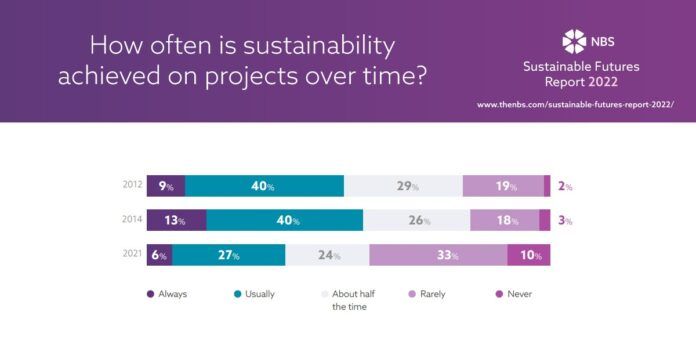The National Building Specification (NBS) has found that only a third of construction professionals manage to deliver sustainability goals in their projects.
NBS’s Sustainable Futures’ Report, which polled 608 construction professionals, found that less people are achieving sustainability targets on projects, compared to those in its 2014 Sustainability Report.
Sustainability setting
Sixty-nine percent of respondents said they had worked on projects where sustainability goals had been included at least some of the time, whilst a quarter (25%), had seen targets ‘most of the time’. However, just 14% had seen targets set on every build.
Meanwhile, just 4% of respondents have worked on exclusively net-zero projects and over half (51%) had not worked on a single net-zero project in the past year.
Breaking the barriers
When identifying the main barriers to success, over half (52%) stated that a lack of client demand was the most common cause – just 1% more than the cost of achieving sustainability (51%). Another concern was the view that sustainable products are being ‘value engineered’ (38%), suggesting cost-cutting measures could rise question marks over quality. 37% also stated that lack of government policy and regulation was another reason for a lack of take up of sustainable practices.
For contractors, contractual risks were a main barrier to achieving sustainability. Meanwhile, from a supplier standpoint, they are more likely to view sustainable products as being ‘value-engineered’, suggesting there is a risk that products may be value engineered out and perhaps showing a need for further education with client and contractor stakeholders.
However, for clients, a lack of management commitment and a lack of sustainable performance information were marked as a major barrier.
Personal responsibility
Nearly all respondents (97%) said that sustainability is either important or quite important to them personally. The topic also appears to resonate with their executive/leaderships, with 81% placing it as either important or quite important. The same is seen with the organisations they work for (85%).
Diving deeper still, when asked why they personally think about sustainability in projects, 87% put that their own personal beliefs and values played a key part in the decision making. Over half (53%) also stated that they like to lead by example.
>>Read more about sustainability in the industry here.




